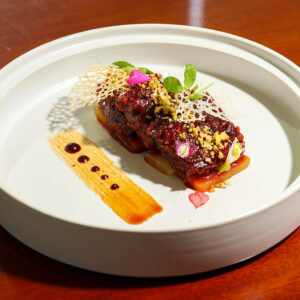THE ANNUAL visits of celebrity chef Jereme Leung (he was on MasterChef China, and is a two-time recipient of the Five Star Diamond Award by the American Academy of Hospitality Science) to his restaurants around the world (in eight cities in six countries) means special menus when he drops by, and he does exactly that with The Emperor’s Table, a special menu at China Blue by Jereme Leung at Conrad Manila.
When we think of imperial dining, we think of gaiety and gilding. However, the emperor at this table is someone wiser and more sedate, as proven during a tasting on Aug. 22 at the Conrad.
For starters, we had Marinated crabmeat with avocado in crispy puff roll, and Marinated sweet plum drunken King Prawn. The roll became an afterthought to the prawn, served at a lower temperature the better to release its more natural flavors. The result was a large shrimp so fresh it felt like it had just been plucked out of the water.
A second course of soup (Double-boiled sturgeon tendon and dry sea conch with morel mushroom Kung Fu soup) was savored by guests in silence: so much so that a late guest thought we had been at prayer. We might well have been: the soup’s flavor was almost meditative in its cleanliness; and despite all the ingredients in it, tasted almost Buddhist in its austerity.
The main dishes were Wasabi beef wagyu pistachio, green bamboo shoot, Pan-fried black cod with torched ginger flower gravy sauce and pomelo, and Braised Yin Yang rice with dry scallop and dry fish maw, and oyster ginger taste.
The beef collapsed with the slightest tap of a knife, and displayed a great combination of earthiness and sweetness, with a zing from the wasabi. Its texture was sticky and succulent (the beef coming from gelatinous beef cheeks). We felt bad for eating it too quickly, for this dish deserves to be savored.
The black cod, meanwhile, was a contrast to the beef. While its base had a mild texture, it had an aggressive and spicy taste from the ginger flower buds. The final savory course (as per Chinese tradition) was rice, and he made that with orzo (a rice-shaped pasta) and Tibetan rock grains grown 3,000 meters above sea level. The dry scallop and fish maw lent oceanic flavors to this meeting of earth and sky (and the grain itself lent creaminess). The meal ended with coconut mousse and mango puree encased in an enormous chocolate eggshell.
YUNNANDuring the lunch, Mr. Leung remarked that the mushrooms in the soup came from China’s Yunnan province, which according to him, produces about 80% of the world’s fungi. It also has a reputation for being the birthplace of tea drinking, and cannabis. Yunnan’s capital city, Kunming, was one of China’s capitals during the Second World War.
“Kunming used to be a place where they sent officials who fell into disgrace. If they didn’t chop your head off, they sent you to Kunming, almost to the edge of China… living in Kunming would be like hiding in a secret spot where no one could find us,” said Jiang Weili, the main character in Amy Tan’s The Kitchen God’s Wife. Mr. Leung concurred, saying, “Anybody that the Emperor didn’t like, if they could put you into the farthest end of the world, that is Yunnan.”
“Today, of course, it’s no longer like that. But Yunnan produces a lot of ingredients that you can’t cultivate,” he said. We noted his attachment to Yunnan after remembering that this was the second time that Yunnan ingredients were featured in one of his menus (a few years ago, he had placed Yunnan rose petals in ice cream).
“It’s huge, full of natural forests, full of natural things. And a lot of things are not very well-known outside. It serves as an inspiration for me,” he said of the province.
We did note the quiet nature of this menu, compared to the gaiety and frou-frou we might have expected from an emperor’s table. In the end, however, the dishes that did appear on our plates proved to be more substantial. The chef explained: “I think food in itself is not about the most expensive… the rarest. The ingredients that I pick every time when I do a menu is about what is interesting.
“Not necessarily the finest caviar, the rarest wine — good food is never about that. Good food is about what arouses people’s interests. It’s about the thought that was in the preparation.”
The set menu is priced at P6,588 net per person, and will be available for both lunch (11 a.m. to 2:30 p.m.) and dinner (6 to 10 p.m.), daily until Sept. 30. For inquiries and reservations, call 8833-9999, 0917-650-4043, or emailMNLMB.FB@ConradHotels.com. — Joseph L. Garcia
